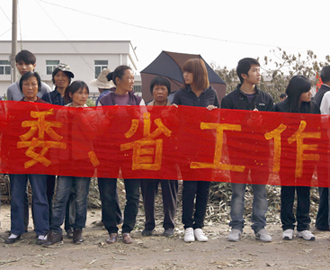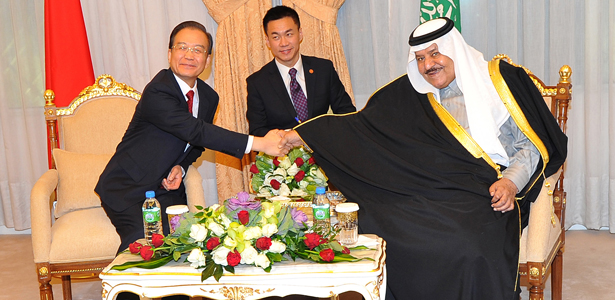China's Dilemma on Iran
Is the threat of an Israeli air strike leading Beijing to consider other sources of energy?
Chinese Prime Minister Wen Jiabao is on a six-day trip to three of the Middle East's major oil producers: Saudi Arabia, Qatar, and the United Arab Emirates. All three are close U.S. allies; a Chinese Prime Minister has not visited Saudi Arabia in two decades. But the biggest news here may be the Middle Eastern energy exporter he isn't visiting: Iran, China's third-greatest source of oil. There's no reason to believe that the China-Iran relationship is ending, but this is another indication that China's interest in dealing with Iran may be waning. If that happens, it would do wonders for America's containment strategy, and Washington might have Israel -- and perhaps Tehran itself -- to thank.
The Tehran-Beijing relationship is an important one to both countries. Because international sanctions keep Western firms out of Iran, Chinese state-owned enterprises have found it rife with development opportunities and favorable trade deals, including 11% of the Chinese oil imports helping to fuel China's growing economy. Iran desperately needs China, its biggest buyer, to displace Western business and keep its increasingly troubled economy afloat. But the relationship is far more important for Iran, where the leadership likely fears that a drop in oil exports could return protesters to the streets, than it is for China.
(Iran also needs China's support at the United Nations Security Council -- or, rather, they need China to continue opposing Western-led efforts at UNSC sanctions against Iran. But their opposition may not be especially predicated on the Beijing-Tehran economic relationship, as both China and Russia have long insisted that whatever a country does internally is basically none of the UN's business, and China would likely oppose sanctions even if it did not buy energy from Iran.)
That relationship may not be as stable as it was just a few years ago. In January, China cut its Iranian imports by 40% over a pricing dispute. As China attempts to slow down its economy, its appetite for energy will not drive foreign policy quite as completely. Wen's visit to other oil-producing Persian Gulf states is widely seen as an attempt to diversify Chinese oil imports, a smart move given the region's notorious political instability. And the U.S., China's most important trading partner by far, is strongly urging it and other Asian nations to reduce their Iranian imports. But another contributor to Beijing's apparent drift away from Tehran may be a fear that Iranian oil will not always flow reliably. Though China wants to slow its economic growth, a sudden drop in its energy imports could be disastrous. And Iranian energy looks less secure than ever.
If you are a Chinese party analyst worried about Iranian oil exports, this month has probably been a bad one for you. Iran has threatened to close the Strait of Hormuz, which would send oil prices skyrocketing. Israel is still making noise about a possible military strike against any possible Iranian nuclear program, which Iran claims it is continuing. And Iran has blamed the U.S. and Israel for the mysterious assassination of one of its nuclear scientists. While a military confrontation between Iran and either Israel or the U.S. remains far from certain, all of these events certainly seem to make it more likely. And that would be terrible news for China, as it would send global oil prices skyrocketing, doing great damage to its economy at a sensitive moment.
China's dilemma on Iran is how to maintain access to as much cheap Middle Eastern oil as possible. Other factors -- Israel or Saudi security, the American obsession with nuclear non-proliferation, the complexities of Middle Eastern politics -- are probably important to Beijing only to the extent that they inform their access to oil. And the best way to keep that access open may be to avoid war first and to avoid sanctions second; though sanctions will reduce China's Iranian imports, a war could disrupt oil production in the entire Middle East. China, then, has two bad choices. The first is to join in further United Nations sanctions, thus reducing their own access to Iranian oil significantly but perhaps easing Israeli and American concerns enough to keep them from attacking Iran. The second is to oppose move sanctions, which will retain their access and may also help keep Tehran confident enough in their own security to avoid military or nuclear adventurism.
MORE ON CHINA | |
|---|---|
 | Crisis in Europe, Transformation in China |
 | A Jasmine Moment? |
 | 500 Protests a Day, but Still Stable |
 | Christmas in China |
 | Notes on the Rise of China |
In a 2010 study with the Jamestown Foundation on China's Iran policy, analyst Yitzhak Shichor concluded, "Compelled to make a choice between sanctions and war, Beijing may ultimately prefer the former to the latter, something it has done before." If he's right, then the best way to get China to support Iran sanctions is by convincing the Beijing leadership that an absence of sanctions makes war more likely. It's not actually clear whether or not sanctions will improve Iran's behavior: a weakened Tehran will behave more aggressively, but its capability to do enough actual damage to provoke war will be reduced.
But there's an outside chance that Israel -- which is itself not always the world's most predictable actor -- could convince China that it may attack Iran and spark a regional war in the absence of UNSC sanctions, regardless of whether or not that is actually a rational decision. But, for China to drop its opposition to sanctions, it's probably not even necessary that China believes Israel will strike Iran if Tehran is not sufficiently crippled by sanctions, just that Israeli might. And Israel does seem increasingly bent on moving towards war.
This might be a significant part of why Wen is touring Saudi Arabia, Qatar, and the UAE for alternative oil sources. Of course, as Winston Churchill famously said, diversity of supply is always the most important strategy for an oil-importing nation. But there's probably a reason why China seems especially interested in diversifying away from Iran right now. As conflict with Iran appears more likely, China will be less interested in doing business there and more interested in doing whatever it can to prevent a regional war. Ironically, for all Beijing's insistence on not interfering with other nations' internal politics, a Chinese decision to buy less Iranian oil could do more to alter Tehran's behavior than the killings of a dozen nuclear scientists.
